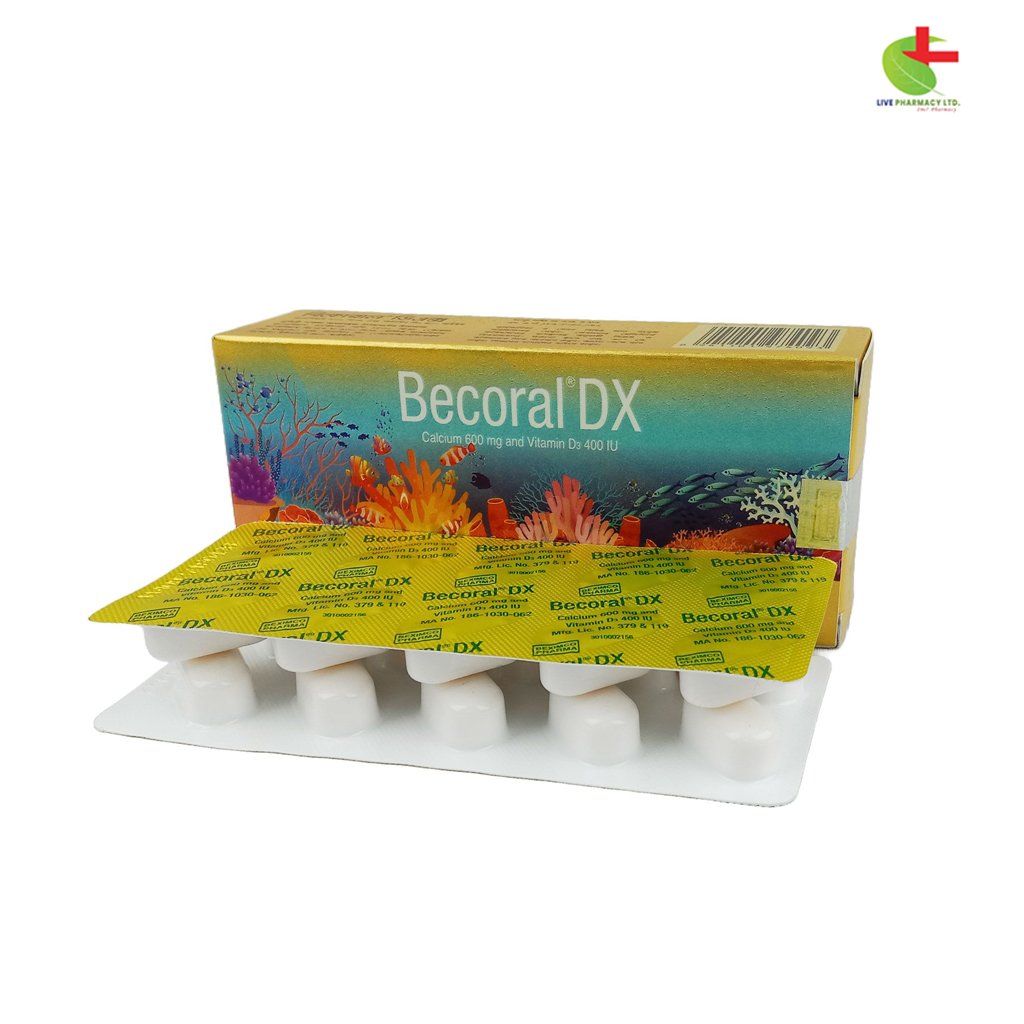Becoral DX
150.00৳ Strip
- Becoral DX supports bone health by treating and preventing osteoporosis, osteomalacia, tetany, hypoparathyroidism, and disorders of osteogenesis.
- Each tablet features coral-derived calcium carbonate and vitamin D to boost calcium absorption and bone strength.
- Suitable for those with inadequate calcium intake, including children, pregnant and lactating women, and elderly patients.
- Also useful as a phosphate binder in chronic renal failure and for conditions like pancreatitis.
- Follow dosage instructions carefully and monitor for any potential interactions with other medications.
 Brand
Brand
|
Beximco Pharmaceuticals Ltd |
|---|---|
 Generics
Generics
|
Coral Calcium + Vitamin D3 |
 Type
Type
|
Tablet |
Indications
Becoral DX is utilized for the treatment and prevention of various bone-related conditions, including osteoporosis, osteomalacia, tetany, hypoparathyroidism, and osteogenesis disorders. It also serves as a supplement for individuals with inadequate calcium intake, including children, pregnant and lactating women, and the elderly. Additionally, Becoral DX is effective in managing pancreatitis and as a phosphate binder in chronic renal failure.
Composition
- Each tablet of Becoral DX contains 1250 mg of Calcium Carbonate (from coral sources), providing 500 mg of elemental calcium and 200 IU of Vitamin D.
- Each DX tablet offers 1500 mg of Calcium Carbonate (from coral sources), equating to 600 mg of elemental calcium and 400 IU of Vitamin D.
- Each effervescent tablet includes 1500 mg of Calcium Carbonate (from coral sources), delivering 600 mg of elemental calcium and 400 IU of Vitamin D3 (Cholecalciferol).
Pharmacology
Calcium is crucial for various bodily functions and is essential for preventing and treating osteoporosis and associated fractures. Vitamin D enhances calcium absorption in the gastrointestinal tract and stimulates bone formation. The coral calcium in Becoral DX closely resembles human bone in its chemical structure, promoting better absorption. Vitamin D3 helps maintain calcium balance in the body.
Dosage & Administration
- Take one tablet once or twice daily with plenty of water, or as directed by a physician. For better absorption, take with a full stomach.
- Dissolve one effervescent tablet in a glass of water and stir well before drinking. Ensure to take with a full stomach for optimal absorption.
Interactions
- Thiazide diuretics may reduce calcium excretion, raising the risk of hypercalcemia; regular serum calcium monitoring is advised.
- Systemic corticosteroids may decrease calcium absorption, potentially requiring an increased calcium dose.
- Ion exchange resins or laxatives might reduce vitamin D absorption.
- Calcium carbonate may interfere with tetracycline absorption; separate their intake by at least 2 hours.
- Hypercalcemia may enhance cardiac glycoside toxicity; monitor ECG and serum calcium levels.
- When using bisphosphonates or sodium fluoride, take Becoral DX at least three hours before to prevent reduced absorption.
- Avoid consuming foods high in oxalic or phytic acids within two hours of taking calcium supplements.
Contraindications
Becoral DX should not be used by individuals with:
- Hypercalcemia or hyperparathyroidism
- Hypercalciuria or nephrolithiasis
- Hypersensitivity to any component
- Severe renal insufficiency
- Concurrent digoxin therapy (requires careful serum calcium monitoring)
Side Effects
Potential side effects include gastrointestinal irritation, constipation, allergic reactions, nausea, vomiting, decreased appetite, and drowsiness. Skin rash may occur following Vitamin D supplementation.
Pregnancy & Lactation
- During pregnancy, do not exceed 1500 mg of calcium and 600 IU of vitamin D daily. High doses can adversely affect fetal development. Vitamin D at therapeutic levels is generally not teratogenic.
- Becoral DX can be used during breastfeeding, but remember that calcium and vitamin D pass into breast milk.
Precautions & Warnings
- Long-term treatment requires monitoring of serum calcium levels and renal function, especially in elderly patients and those with cardiac or renal issues.
- Reduce or discontinue treatment if hypercalcemia or renal impairment occurs.
- Use vitamin D cautiously in renal impairment; other forms of vitamin D may be needed.
- Monitor patients with sarcoidosis and those immobilized due to osteoporosis to avoid hypercalcemia.
Overdose Effects
- Overdose may cause hypervitaminosis D and hypercalcemia, with symptoms like anorexia, nausea, vomiting, constipation, abdominal pain, and severe cases of cardiac arrhythmias or renal damage.
- Treatment involves discontinuing calcium and related treatments, rehydration, and possibly using diuretics, bisphosphonates, calcitonin, or corticosteroids. Monitor electrolytes, renal function, and ECG in severe cases.
Therapeutic Class
Specific mineral and vitamin combined preparations
Storage Conditions
Store below 30°C, protected from light and moisture. Keep out of reach of children.













Reviews
There are no reviews yet.